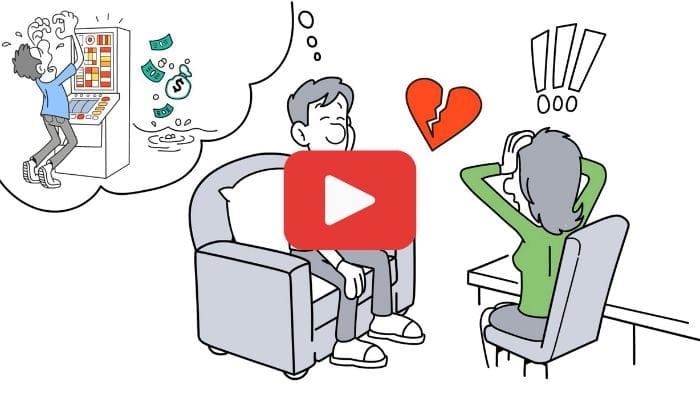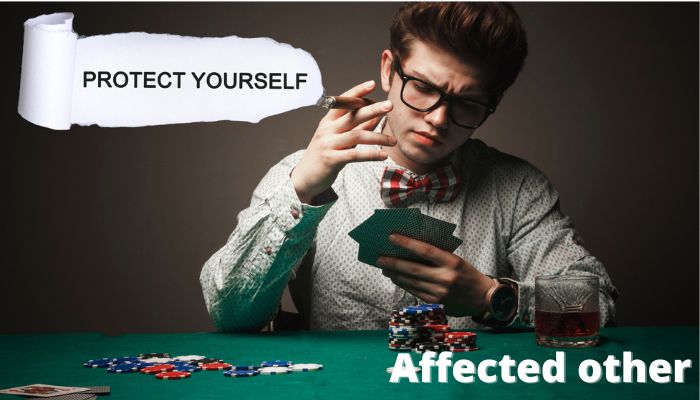Do you have a gambler in the family and no idea what to do? Would you like some help? We have created a video course for family members to help you:
- Understand why the person gambles.
- Get the situation under control.
- Protect your finances and mental health.
- Create the hope, motivation, and courage you need to act.
- Give you tips and tools so you know how to help the gambler.
Here is a list of 21 things you can do to protect yourself from a compulsive gambling spouse:
- Don’t lend money to your spouse
- Please don’t pay their debt
- Order new cards to ensure only you know the codes
- Cut any credit cards
- Change passwords
- Keep an eye on the post
- Take control over the finances – Set up auto payments
- Please don’t put your name on anything you don’t know what it is.
- Read about gambling addiction
- Read about co-dependence
- It’s not your fault
- Socialize with other people
- Don’t accept bad behavior
- Focus on yourself first
- Confide in someone you trust
- Don’t be afraid to seek professional support
- Join QuitGamble and ask questions
- Learn Nonviolent communication
- Focus on communication
- Let the gambler know you want to help them
- Relate to them as equal
That was a long list. Let’s take a closer look at it and split it into three categories: Protect your finances, mental health, and relationships. Each area is crucial to reducing a gambling partner’s negative repercussions on your life. If you follow the list, you’ll also be better prepared to help your gambling spouse when he/she is ready to stop gambling.
Protect your finances from gambling spouse
Money is the problem most people talk about when it comes to compulsive gambling. If you have discovered your spouse has gambling problems. It would help if you react quickly to protect your financial assets.
Here are eight things you can do to protect your assets from a gambling spouse today:
- Never lend money to a gambling addict. Lending money only makes things worse. It enables the gambling spouse to continue to feed the gambling addiction. Lending money will only create more harm or gambling debts.
- Never pay your gambling spouse’s debt. It’s the same as lending money. Compulsive gamblers are constantly chasing money with which to gamble. If you try to help them by paying their debt, you show them there is a way to continue gambling. You try to do something good, but it’ll have the opposite effect. Mounting debt is one-way gamblers realize they have a problem.
- Order new credit/debit cards for yourself. Chances are that your gambling partner knows the codes of your old card and can use the cards to finance the gambling. Getting new cards and keeping the codes for yourself eliminates that possibility.
- Change passwords. Update the passwords for your online banking or other payment methods.
- If you share bank cards with your partner, cut any shared credit cards and contact the bank to separate your bank accounts. You mustn’t share bank accounts anymore. You must be the only one who has access to your money.
- Keep an eye on the post. Pay extra attention to bills and other finance-related things, both your bills and your gambling husband’s (or wife’s).
- Never sign anything unless you know what it is. Be careful with anything you sign. It could be a loan agreement or something else you will regret later.
- Take control of the finances. Set up auto-payments of bills, so they get paid directly when the salary comes. If your spouse with gambling problems agrees, you can take over all the money in the relationship and only give them money for the things they need. That way, you work together to help them overcome gambling addiction.
Protect your mental health from gambling spouse
Money is essential, but your mental health and well-being are equally important. Our guide to helping people with gambling problems discusses co-dependence and putting yourself first. You can’t help anybody if you don’t feel well. If you think my partner has a gambling problem, here are some ways you can protect your mental self:
- Learn about gambling addiction. You’ll realize this isn’t your fault as soon as you learn about addiction. People get addicted to gambling because they use it as an escape. You’re not responsible for that.
- Read the guide about co-dependence. When you live close to an addict, you can develop a co-dependency. It means you start adapting to the person’s behavior instead of preventing it. You want to be the best partner in the world, so adjust your life to the addict’s life. It would be best if you avoided this.
- It’s not your fault. Addicts are experts at hiding their problems. It’s not your fault that you haven’t seen anything before!
- Focus on yourself. Continue doing things you love, focus on your health, keep active, and ensure you feel well. Of course, it might not be easy to feel well when someone close to you suffers, but you need to be egoistic. You can’t help anybody if you don’t feel well first.
- Never accept bad behavior. Some symptoms of gambling addictions are mood swings. People don’t show up on time (or at all), and restlessness. You mustn’t accept rude behavior or let others dictate your life. If you approve it once, it’ll soon become the new normal.
- Socialize with other people. Meet your friends and spend time with people other than your spouse. Spending time with people you love is energizing and calming.
- Confide in someone. While talking about meeting other people, it’s easy to feel lonely when you have a spouse with a gambling addiction. Try to confide in a friend and share your experience, thoughts, and feelings. If you don’t have anybody you trust. You’re welcome to join the QuitGamble Community. We invite people who want to stop gambling and their affected others.
Protect your relationship from gambling spouse
Gambling has harmed many relationships. But there is hope. There are many things you can do to protect your relationship. If you’re married to a gambling addict, hope isn’t gone. Here are a few things you can do.
- Take our course for Family Members. In 10 videos, you’ll learn about addiction, how to protect yourself both mentally and financially, how to talk to the person and how you can help the person break free from the gambling addiction
- Learn Nonviolent Communication. Sometimes it feel impossible to talk to the gambler. To help you, we recommend you learn Nonviolent Communication, NVC. NVC can help you talk to the person without him/her lashing out. (see video below) It’ll also help prevent co-dependence. It’s a brilliant self-help tool to improve communication between you and your gambling wife or husband. Read more about how to learn Nonviolent Communication here.
- Focus on communication. If you’re married to a gambling addict, tell them you want to help and support them. The more you know about gambling addiction, the easier it will be. We warmly recommend the How to Help a Gambling Addict guide for tips and tricks for your communication.
- Let the person know that you want to help them. Focus on open questions, and avoid judging. The key is to get the person to start talking.
- Talk with your spouse as an equal. Your partner might have broken your trust, but try to talk as if you’re on the same level. Don’t insinuate that they are stupid or treat them differently than you usually would.
- Seek professional help. There are many organizations, counselors, and support groups around the world. QuitGamble.com is one of them; others you might find on Facebook or by calling a location gambling hotline from being afraid to seek help.
Final thoughts
In our video course, we use Nonviolent Communication to help you talk to the gambling addict. Check out the video below to see what a difference it can make.

If you found the video helpful, we highly recommend the full course.
Do you need more help? Check out our new Resource or gambling addiction statistics pages. We’ll keep adding exciting articles, guides, and other tools there.
#gamblingspouse #gamblingharm #affectedother #gamblinghusband #gamblingwife #gamblingpartner #gamblingaddiction
 English
English Español
Español Français
Français Português
Português Svenska
Svenska

